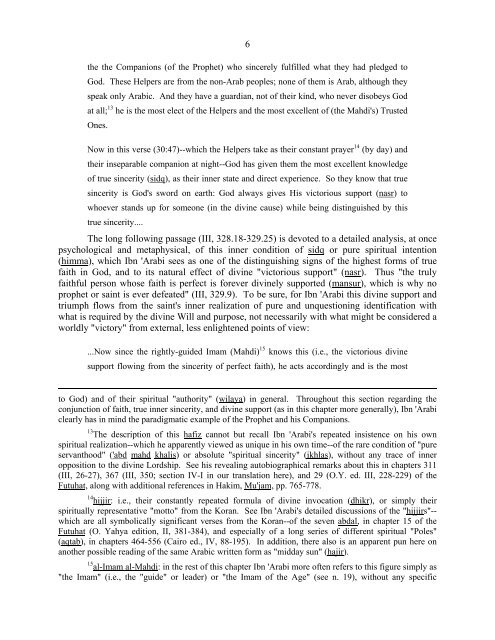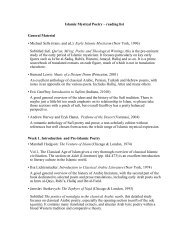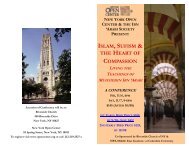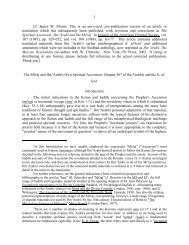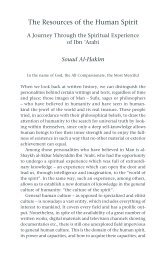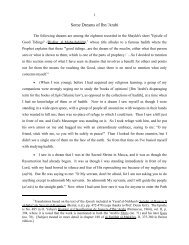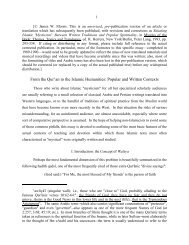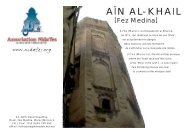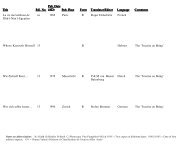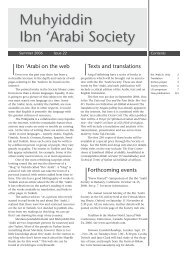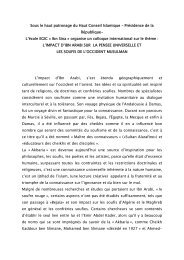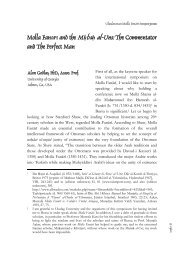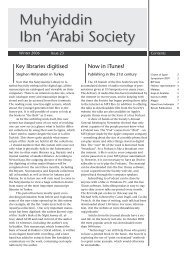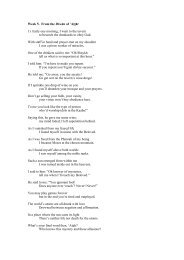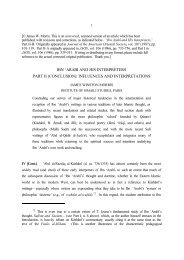The Mahdi and His Helpers - Muhyiddin Ibn Arabi Society
The Mahdi and His Helpers - Muhyiddin Ibn Arabi Society
The Mahdi and His Helpers - Muhyiddin Ibn Arabi Society
You also want an ePaper? Increase the reach of your titles
YUMPU automatically turns print PDFs into web optimized ePapers that Google loves.
6the the Companions (of the Prophet) who sincerely fulfilled what they had pledged toGod. <strong>The</strong>se <strong>Helpers</strong> are from the non-Arab peoples; none of them is Arab, although theyspeak only <strong>Arabi</strong>c. And they have a guardian, not of their kind, who never disobeys Godat all; 13 he is the most elect of the <strong>Helpers</strong> <strong>and</strong> the most excellent of (the <strong>Mahdi</strong>'s) TrustedOnes.Now in this verse (30:47)--which the <strong>Helpers</strong> take as their constant prayer 14 (by day) <strong>and</strong>their inseparable companion at night--God has given them the most excellent knowledgeof true sincerity (sidq), as their inner state <strong>and</strong> direct experience. So they know that truesincerity is God's sword on earth: God always gives <strong>His</strong> victorious support (nasr) towhoever st<strong>and</strong>s up for someone (in the divine cause) while being distinguished by thistrue sincerity....<strong>The</strong> long following passage (III, 328.18-329.25) is devoted to a detailed analysis, at oncepsychological <strong>and</strong> metaphysical, of this inner condition of sidq or pure spiritual intention(himma), which <strong>Ibn</strong> '<strong>Arabi</strong> sees as one of the distinguishing signs of the highest forms of truefaith in God, <strong>and</strong> to its natural effect of divine "victorious support" (nasr). Thus "the trulyfaithful person whose faith is perfect is forever divinely supported (mansur), which is why noprophet or saint is ever defeated" (III, 329.9). To be sure, for <strong>Ibn</strong> '<strong>Arabi</strong> this divine support <strong>and</strong>triumph flows from the saint's inner realization of pure <strong>and</strong> unquestioning identification withwhat is required by the divine Will <strong>and</strong> purpose, not necessarily with what might be considered aworldly "victory" from external, less enlightened points of view:...Now since the rightly-guided Imam (<strong>Mahdi</strong>) 15 knows this (i.e., the victorious divinesupport flowing from the sincerity of perfect faith), he acts accordingly <strong>and</strong> is the mostto God) <strong>and</strong> of their spiritual "authority" (wilaya) in general. Throughout this section regarding theconjunction of faith, true inner sincerity, <strong>and</strong> divine support (as in this chapter more generally), <strong>Ibn</strong> '<strong>Arabi</strong>clearly has in mind the paradigmatic example of the Prophet <strong>and</strong> his Companions.13 <strong>The</strong> description of this hafiz cannot but recall <strong>Ibn</strong> '<strong>Arabi</strong>'s repeated insistence on his ownspiritual realization--which he apparently viewed as unique in his own time--of the rare condition of "pureservanthood" ('abd mahd khalis) or absolute "spiritual sincerity" (ikhlas), without any trace of inneropposition to the divine Lordship. See his revealing autobiographical remarks about this in chapters 311(III, 26-27), 367 (III, 350; section IV-I in our translation here), <strong>and</strong> 29 (O.Y. ed. III, 228-229) of theFutuhat, along with additional references in Hakim, Mu'jam, pp. 765-778.14 hijjir: i.e., their constantly repeated formula of divine invocation (dhikr), or simply theirspiritually representative "motto" from the Koran. See <strong>Ibn</strong> '<strong>Arabi</strong>'s detailed discussions of the "hijjirs"--which are all symbolically significant verses from the Koran--of the seven abdal, in chapter 15 of theFutuhat (O. Yahya edition, II, 381-384), <strong>and</strong> especially of a long series of different spiritual "Poles"(aqtab), in chapters 464-556 (Cairo ed., IV, 88-195). In addition, there also is an apparent pun here onanother possible reading of the same <strong>Arabi</strong>c written form as "midday sun" (hajir).15 al-Imam al-<strong>Mahdi</strong>: in the rest of this chapter <strong>Ibn</strong> '<strong>Arabi</strong> more often refers to this figure simply as"the Imam" (i.e., the "guide" or leader) or "the Imam of the Age" (see n. 19), without any specific


